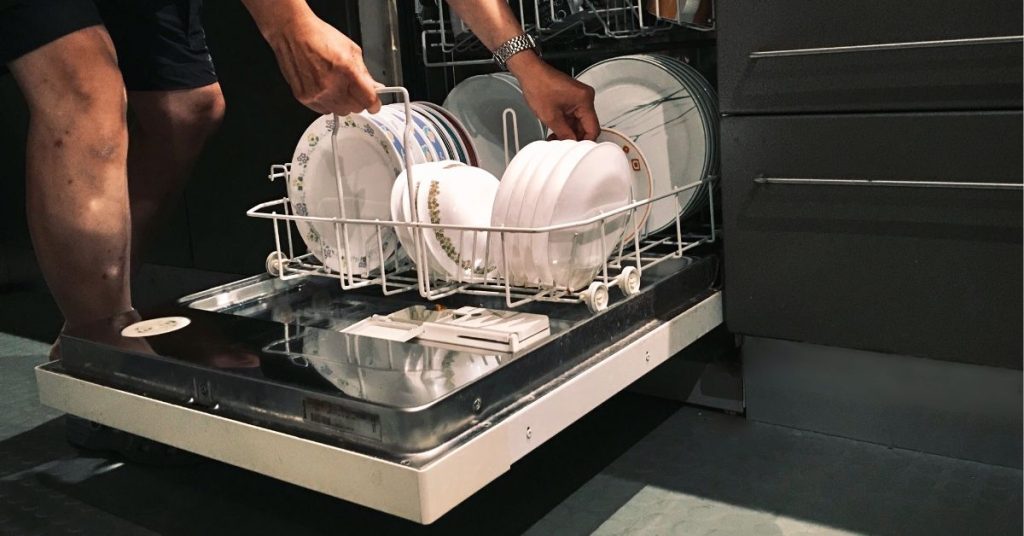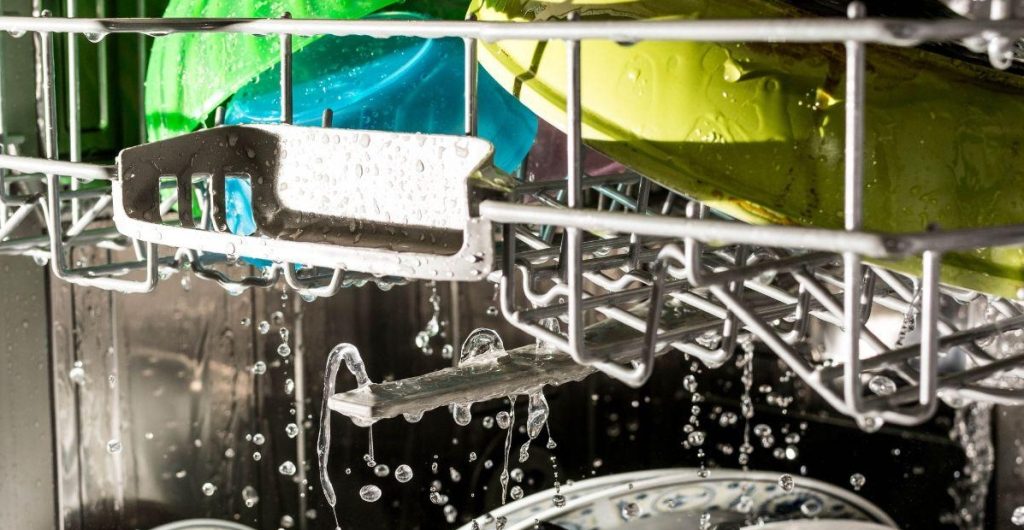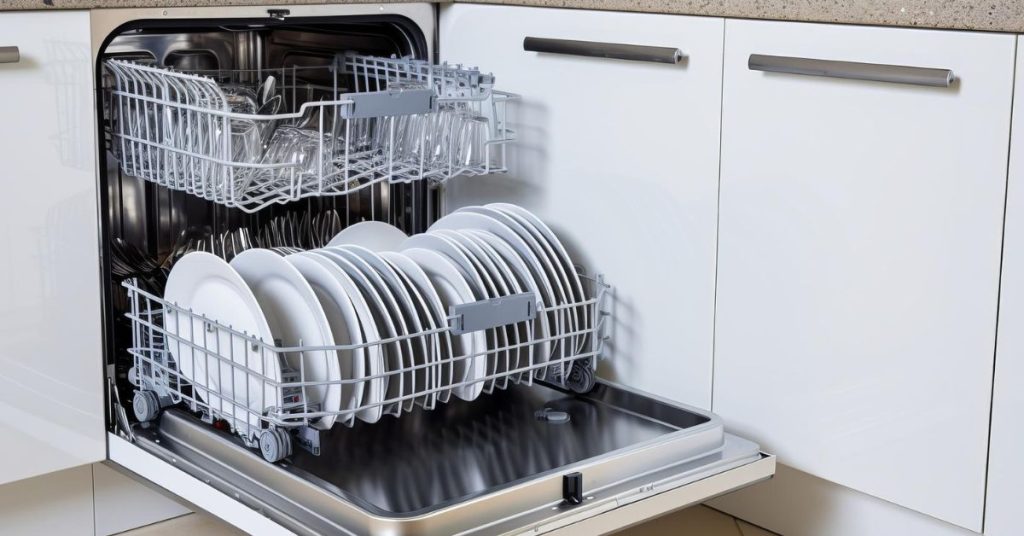Most dishwashers are designed to be connected to your home’s hot water supply. The main reason is efficiency. Hot water helps to dissolve detergent more effectively. The dishwasher is generally better at breaking down grease and food particles, helping to clean the dishes more thoroughly. Upon starting the dishwasher, it draws hot water from the hot water line that’s connected to your water heater. It’s not unusual for the first few gallons of water to be less than hot. This situation has some people run hot water in their kitchen sink before starting the dishwasher. Once inside, the dishwasher uses spray arms to distribute the hot water and detergent mixture across the dishes. Dishwashers usually use 3-5 gallons of water per cycle.
This amount varies depending on the model and washing settings. The dishwasher heats the water to an appropriate temperature. The temperature typically varies between 130 and 170 degrees Fahrenheit, using a built-in heating element. This is especially important in cycles like the “sanitize” cycle, which require higher temperatures to eliminate bacteria effectively. The heating element in a dishwasher does more than just heat the water during the wash cycle. It also plays a crucial role in drying the dishes. After the final rinse, the heating element starts again to speed up evaporation during the drying process. This setting leaves you with clean and dry dishes. However, you must know that it is technically possible to run a dishwasher with cold water. However, if hot water is not available, some models have heavy-duty heating elements that can heat the cold water to the desired temperatures. It’s important to check your dishwasher’s specifications to ensure it has this capability.[(( Do Dishwashers Use Hot Water? Understanding Your Appliance))]
The Role of Temperature in Cleaning
All brands of dishwashers need really hot water to work their best. In my 30 years of appliance repair, I’ve seen many dishwashers not cleaning well and not melting the soap because the water wasn’t heating properly. The 120-degree water from your home’s water heater generally isn’t hot enough for your dishwasher to do its job. That’s why most dishwashers boost that water’s temperature to 160 degrees, high enough to kill all pathogens and melt all your dishwasher soap. If you open your dishwasher door 30 minutes into the cycle, you should see a big plume of steam billowing out. If not, something’s wrong with your dishwasher’s heating system.
The most common reason for a dishwasher not heating properly is the water inlet valve not letting in enough water to activate the heater. At 30 minutes into the cycle, if you open the door you should see water high enough to touch the heating element near the bottom of the dishwasher. Some dishwashers, like Bosch and Miele, feature hidden heating elements. The water level on Bosch dishwashers should reach the top of the round plastic filter handle. On Miele dishwashers, it should reach the bottom of the white plastic filter handle. When a dishwasher’s fill valve doesn’t let in the right amount of water, the water won’t heat enough to clean the dishes. Replacing the fill valve could solve this problem.[(( Do Dishwashers Use Hot Water?))]
Hot water dissolves and activates dish detergent and pods while helping to break down grease on your dishes. Some dishwashers have cycle settings like the Hi-Temp Wash or the Sanitize Cycle to raise the water temperature during the wash cycle. The Hi-Temp setting helps to cut through baked-on food and residue, while the higher wash and dry temperatures of the Sanitize Cycle can help kill 99.999% of food soil bacteria. How a dishwasher maintains hot water temperatures varies depending on the model. Some dishwashers use a heating element to heat cold water to the proper cleaning temperatures, while others draw hot water in through the hot water valve.[(( Do Dishwashers Use Hot Water?))]
Hot Water Sources: Internal Heating vs. Home Supply
Do dishwashers use hot water, or do they heat cold water? Here’s what you need to know. All dishwashers use hot water during the cleaning cycle. The difference is in where the hot water comes from. There are two main types of standard-size dishwashers that are commonly available in the US. The first has a cold-water hookup—it fills a tub at the base of the dishwasher with cold water and uses an element to heat the water. The dishwasher has an internal thermostat to regulate water temperatures and ensure that it’s always operating at the optimum temperature. The second type hooks up to your household hot water supply, so when it’s running, it draws water from your hot water tank.
So, if your water heater isn’t working for any reason, this will impact the water temperature in your dishwasher, meaning the cleaning ability will be reduced. For a dishwasher with a hot water hook up, your water heater will need to be set up to deliver water at a minimum of 120ºF. Most dishwashers will operate the main wash cycle at around 120–150ºF and will use an internal element to heat water to higher temperatures for rinsing. To ensure your dishwasher draws in water at the correct temperature, run the hot tap in your kitchen sink until hot water comes through before you hit start on your dishwasher. This makes sure the dishwasher takes in hot water immediately instead of all of the water that’s cooled down in the pipe.[(( Do dishwashers use hot water? Here’s what you need to know))]
Efficiency and Environmental Impact
Dishwasher technology has improved dramatically over the last decade and new ENERGY STAR certified models include several innovations like soil sensors, improved water filtration, more efficient jets, and dish rack designs that reduce energy and water consumption and improve performance. By reducing water consumption, ENERGY STAR certified dishwashers also help protect our lakes, streams, and oceans. Using your dishwasher is more energy efficient than washing your dishes by hand AND it is a lot less hassle. But how you use the dishwasher is almost as important.
By using the dishwasher more efficiently you can save even more money and energy in the kitchen. Here are some simple dishwasher tips to help you optimize your savings: With the right dishwasher and detergent, there is no need to pre-rinse dishes before loading them into your dishwasher. Washing dishes by hand wastes more energy and water than using an ENERGY STAR certified dishwasher; avoid washing the dishes in the sink in between runs and use the dishwasher for larger items that are dishwasher safe such as pots and pans.[(( Dishwashers | Department of Energy))]
On average, a standard dishwasher will use about 3 to 5 gallons of hot water per cleaning cycle. Keep in mind, however, that this will vary depending on the washing settings. For example, a Quick Wash Cycle (20-60 minutes) will use less water than a Heavy Duty Cycle (3 to 4 hours). Dishwashers that are ENERGY STAR-certified will also use less water. You can run a dishwasher cycle with cold water, however, it won’t be nearly as effective. For one thing, it won’t be able to dissolve grease and stains completely, meaning your dishes may come out with stuck-on residue. Not only that but the temperature won’t be high enough to dissolve and activate the detergent. That’s not all, due to the cooler temperature, it won’t be able to sanitize your dishes effectively either.[(( Do Dishwashers Use Hot Water or Do They Heat Internally?))]
Common Issues with Hot Water in Dishwashers
Other common dishwasher problems can include blockages in the spray arms or filters, resulting from food particles or other debris. These blockages can restrict the flow of hot water and detergent, leading to poorly cleaned dishes. Dishwashers can also experience issues with their water hookup. Leaks or poor connections can occur and might impact the appliance’s access to the hot water supply. Finally, faulty or worn-out heating elements can prevent the dishwasher from adequately heating the water. In turn, it will affect the wash cycle’s effectiveness and the drying process. All the above will help keep your dishwasher running efficiently. If problems persist, consider seeking the help of a professional.[(( Do Dishwashers Use Hot Water? Understanding Your Appliance))]
If your dishwasher’s water is too cold, your dishes may not be getting the best clean. Dishwasher detergent typically requires hot water to properly activate and dissolve, which is why it is important to ensure that your dishwasher is maintaining the proper water temperature. Typically, you can check your dishwasher’s hot water supply by testing the water temperature of the kitchen faucet. Place a candy or meat thermometer in a glass and fill the glass with hot water from the kitchen sink. If the thermometer reads between 120–150°F, your hot water supply is okay. If your dishwasher is not filling with water at all, there are other issues to inspect and troubleshoot.[(( Do Dishwashers Use Hot Water?))]
Personal Reflection
As someone who’s always been curious about how everyday appliances work, researching this topic was eye-opening. It’s fascinating how dishwashers balance efficiency, sanitation, and practicality through their use of hot water—whether sourced from your home’s supply or heated internally. What struck me most is the consistency across sources: hot water isn’t just a preference, it’s a necessity for effective cleaning and germ-killing. Yet, the environmental angle adds a twist—modern dishwashers prove you don’t have to sacrifice sustainability for cleanliness. It’s a reminder of how technology evolves to meet both our needs and the planet’s. If you’re like me, you might now think twice before skipping that pre-cycle sink rinse—it’s a small step that makes a big difference!
Frequently Asked Questions (FAQ)
Q: Do all dishwashers use hot water?
A: Yes, all dishwashers use hot water during the cleaning cycle. The difference is in where the hot water comes from—some connect to your home’s hot water supply, while others heat cold water internally using a heating element.[((Do dishwashers use hot water? Here’s what you need to know))]
Q: Can I run my dishwasher with cold water?
A: Yes, but it’s not optimal. If your dishwasher takes in cold water, it can still clean the dishes, but it will take much longer to finish the cycle. If the situation continues for many cycles, the heating element may wear out prematurely.[((Do Dishwashers Use Hot Water?))]
Q: How hot does the water need to be in a dishwasher?
A: Ideally, the water temperature will remain between 120°F and 155°F for the entire dishwasher cycle. Too cold, and the dishes might not get clean enough. Too hot, and the detergent might not work properly. Modern dishwashers often have sensors to ensure the water stays in the ideal temperature range.[((Do Dishwashers Use Hot Water?))]
Q: Why do my dishes come out dirty if the dishwasher uses hot water?
A: If your dishes are not coming out fully clean, it could be due to a lack of hot water caused by a faulty heating element, a clogged water inlet valve, or blockages in the spray arms or filters. Check these components or consult a professional.[((Do Dishwashers Use Hot Water? Understanding Your Appliance))]
Q: Are dishwashers more efficient than hand washing?
A: Yes, washing dishes by hand wastes more energy and water than using an ENERGY STAR certified dishwasher. A standard Energy Star-certified dishwasher uses about four gallons of water per cycle, far less than the 15 gallons hand washing can use every 15 minutes.[((Dishwashers | Department of Energy))]







